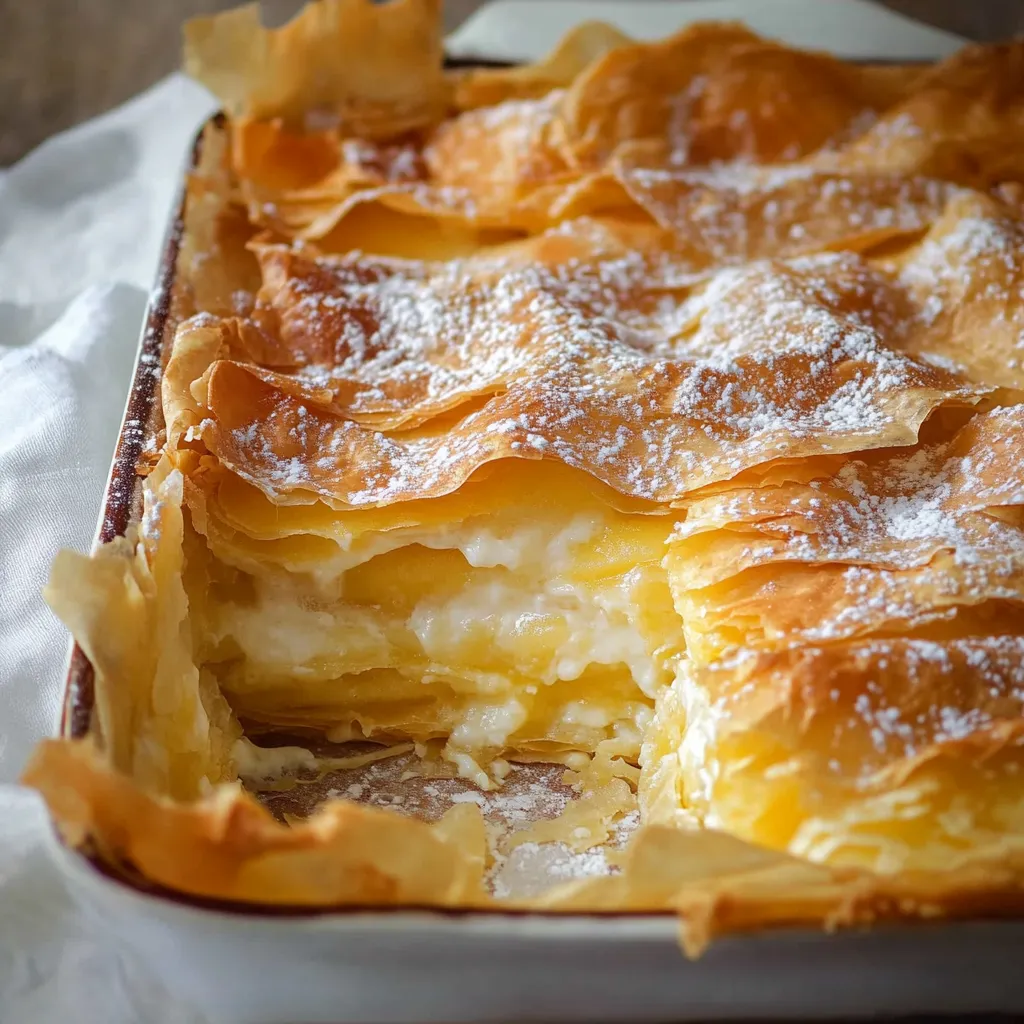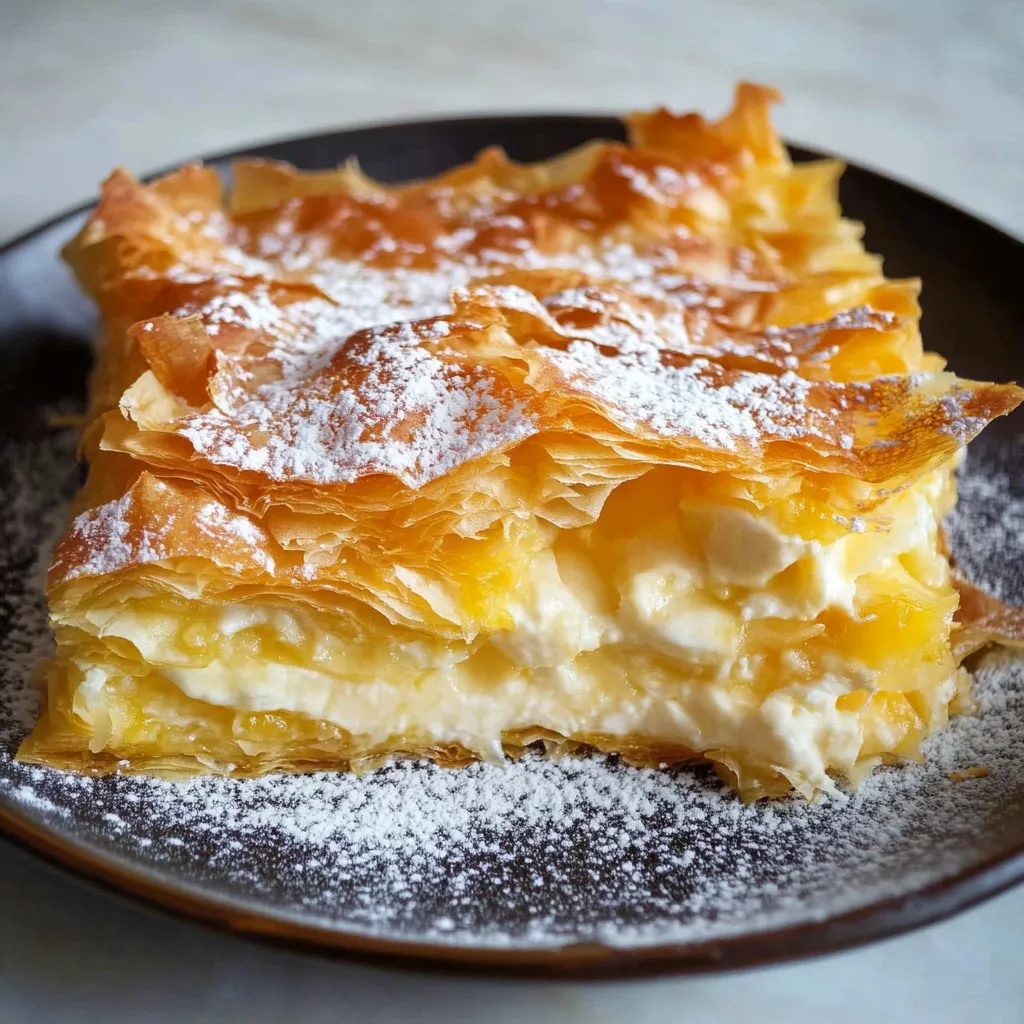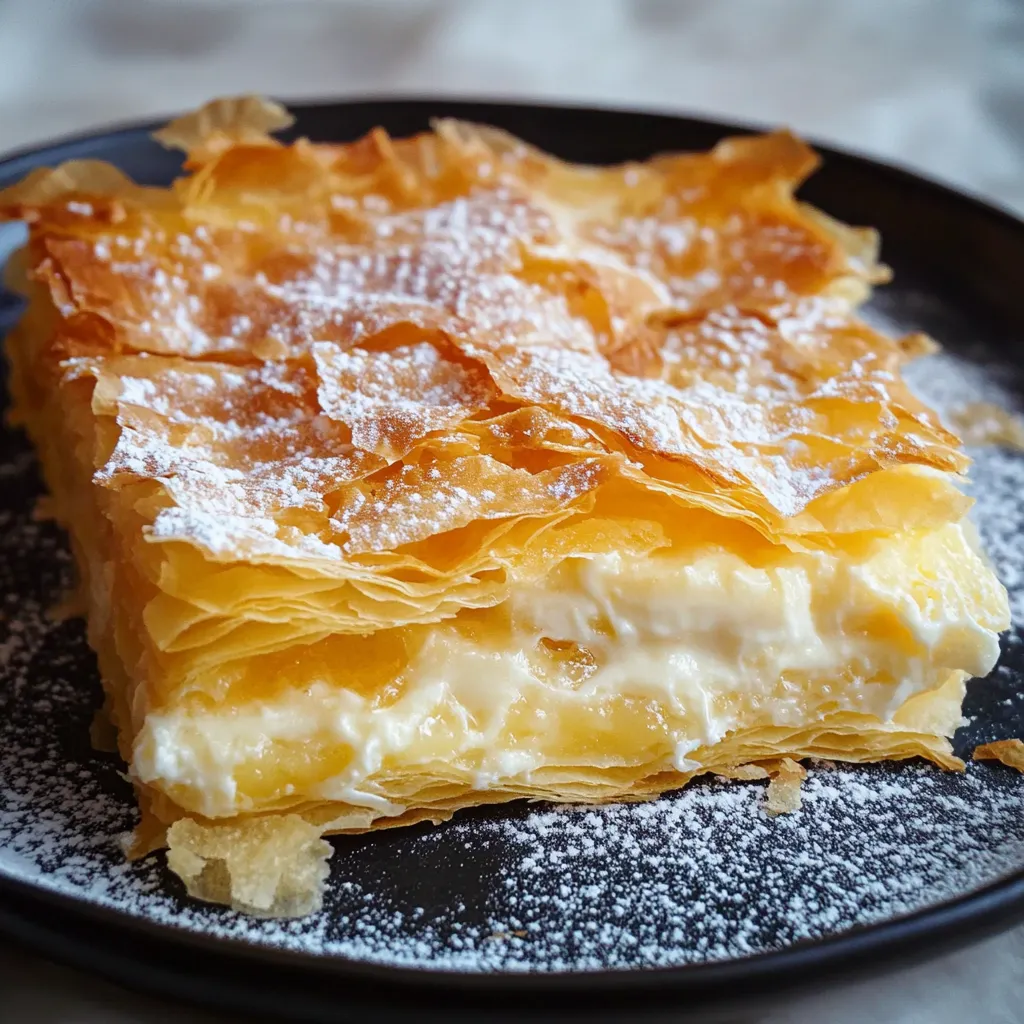 Pin it
Pin it
This delectable Greek bougatsa combines layers of flaky filo pastry with a silky smooth custard cream, creating a heavenly balance of crispy exterior and creamy interior. Finished with a generous dusting of icing sugar and cinnamon, it's the perfect balance of textures and flavors that transports me straight to a Greek café with every bite.
I first tasted authentic bougatsa while traveling through northern Greece and became instantly obsessed. After numerous attempts to recreate that perfect texture at home, this recipe finally captures the essence of what makes this treat so special.
Ingredients
- Phyllo pastry sheets: the foundation of bougatsa providing that signature flaky texture; look for refrigerated sheets in good condition without tears
- Butter: creates the golden crispy layers and rich flavor; use unsalted for better control of the final taste
- Fresh milk: forms the base of the custard; whole milk gives the richest result but 2% works well too
- Sugar: balances the custard without making it overly sweet
- Vanilla extract: adds warmth and depth to the custard; pure extract provides the best flavor
- Cornstarch: thickens the custard to the perfect consistency without making it heavy
- Eggs: provide richness and help set the custard; use room temperature eggs for best results
- Icing sugar: creates the signature sweet dusting that melts slightly into the warm pastry
- Ground cinnamon: adds the traditional aromatic finish that completes the authentic experience
Step-by-Step Instructions
- Prepare The Custard:
- Whisk eggs and cornstarch together in a mixing bowl until completely smooth and free of lumps. This creates the base for thickening the custard properly and ensures a silky texture without any clumps. Take your time with this step as proper mixing here prevents lumps later.
- Heat The Milk Mixture:
- Combine milk, sugar and vanilla in a cooking pot over medium-high heat. Stir occasionally to help dissolve the sugar completely and prevent the milk from scorching on the bottom. Watch carefully as milk can quickly boil over. The mixture is ready when small bubbles form around the edges and steam rises from the surface.
- Temper The Eggs:
- Slowly pour about half the hot milk into the egg mixture while whisking constantly. This gradual addition prevents the eggs from cooking too quickly and becoming scrambled. The whisking must be continuous and vigorous to incorporate the hot liquid evenly throughout the egg mixture.
- Finish The Custard:
- Return the tempered egg mixture back to the pot with the remaining milk. Place over medium heat and whisk continuously until the cream thickens to a pudding-like consistency. This takes about 3-5 minutes. You'll know it's ready when the custard coats the back of a spoon and a finger drawn through leaves a clear path.
- Prepare The Base:
- Preheat the oven and prepare your baking dish with melted butter. Take each filo sheet individually and gather it in a wavy pattern rather than laying it flat. This creates pockets of air that will become wonderfully crisp. Arrange five sheets to cover the bottom of the dish completely, creating a textured base with plenty of ridges and valleys.
- Prebake The Base:
- Drizzle one-third of the melted butter over the arranged filo sheets, making sure to get some butter into all the crevices. Bake for just 5 minutes until golden. This partial baking ensures the bottom stays crispy even after adding the wet custard filling.
- Add The Filling:
- Remove the partially baked base from the oven and pour the custard cream evenly over it. Use a spatula to spread it into an even layer, being careful not to tear the delicate prebaked filo underneath. The warm custard should be thick enough to stay in place without soaking through.
- Create The Top Layer:
- Arrange the remaining filo sheets in the same gathered, wavy pattern on top of the custard. The irregular texture creates more surface area for browning and results in an extra crispy top. Fill any gaps with torn pieces of filo to ensure the custard is completely covered.
- Finish Baking:
- Drizzle the remaining butter over the top layer, ensuring all exposed filo receives some butter for proper browning. Bake until the top is deeply golden and audibly crispy when tapped with a utensil. The edges should curl slightly and take on a deeper color than the center.
- Finishing Touches:
- Allow the bougatsa to rest briefly after baking to let the custard set slightly. Dust generously with icing sugar and cinnamon while still warm so they partially melt into the hot pastry. Serve while still warm for the most magical contrast between crisp pastry and creamy filling.
 Pin it
Pin it
My favorite part of making bougatsa is gathering the filo sheets in that unique wavy pattern. The first time I attempted this technique, I was certain I was ruining the delicate sheets, but the result was the most authentic texture I'd achieved. My Greek neighbor actually applauded when she saw the final result, confirming I'd captured the essence of this traditional treat.
Make-Ahead Options
Bougatsa is truly at its magnificent best when freshly baked, with the contrast between warm, silky custard and shatteringly crisp filo at its peak. However, you can prepare the custard filling up to two days ahead and store it in the refrigerator with plastic wrap directly on the surface to prevent skin formation. When ready to assemble, gently rewarm the custard just enough to make it spreadable before proceeding with the recipe. This significantly cuts down on day-of preparation time while still yielding excellent results.
Serving Suggestions
Traditional Greek bougatsa is typically enjoyed as a breakfast or brunch item, paired with a strong Greek coffee for the authentic experience. For a more substantial morning meal, serve alongside fresh seasonal fruit to balance the richness. When presenting bougatsa as a dessert, consider adding a small scoop of vanilla ice cream for a delightful temperature contrast against the still-warm pastry. In Greece, bougatsa is typically cut into square portions rather than triangles, which helps maintain the structural integrity of the delicate layers.
Regional Variations
While this sweet custard version of bougatsa is most common throughout Greece, regional variations abound that are worth exploring. In Thessaloniki, you'll find bougatsa filled with a savory cheese mixture similar to feta. To try this variation, substitute the custard with a mixture of crumbled feta, a small amount of beaten egg, and a sprinkle of dried herbs. In other regions, a semolina-based custard replaces the cornstarch version, creating a slightly more textured filling with a distinctive flavor. Each Greek region claims their version as the most authentic, making bougatsa a delightful subject of friendly culinary debate.
 Pin it
Pin it
Frequently Asked Questions
- → What is Bougatsa?
Bougatsa is a traditional Greek pastry made with crispy filo dough and a filling of creamy custard, often sprinkled with icing sugar and cinnamon.
- → Can I prepare Bougatsa ahead of time?
Yes, you can prepare the custard ahead of time and store it in the refrigerator. Assemble and bake the filo layers just before serving for the crispiest results.
- → What type of filo pastry should I use?
Use pre-made filo sheets available in most grocery stores. Ensure they're thawed before use if frozen.
- → How do I prevent my filo from drying out?
While working with filo pastry, keep the remaining sheets covered with a damp cloth to prevent them from drying out.
- → What can I use instead of cinnamon for topping?
If cinnamon isn't to your taste, you can use powdered nutmeg or simply serve Bougatsa with just icing sugar on top.
- → Is Bougatsa suitable for vegetarians?
Yes, Bougatsa is suitable for vegetarians as it contains no meat products. However, it does include eggs and dairy.
